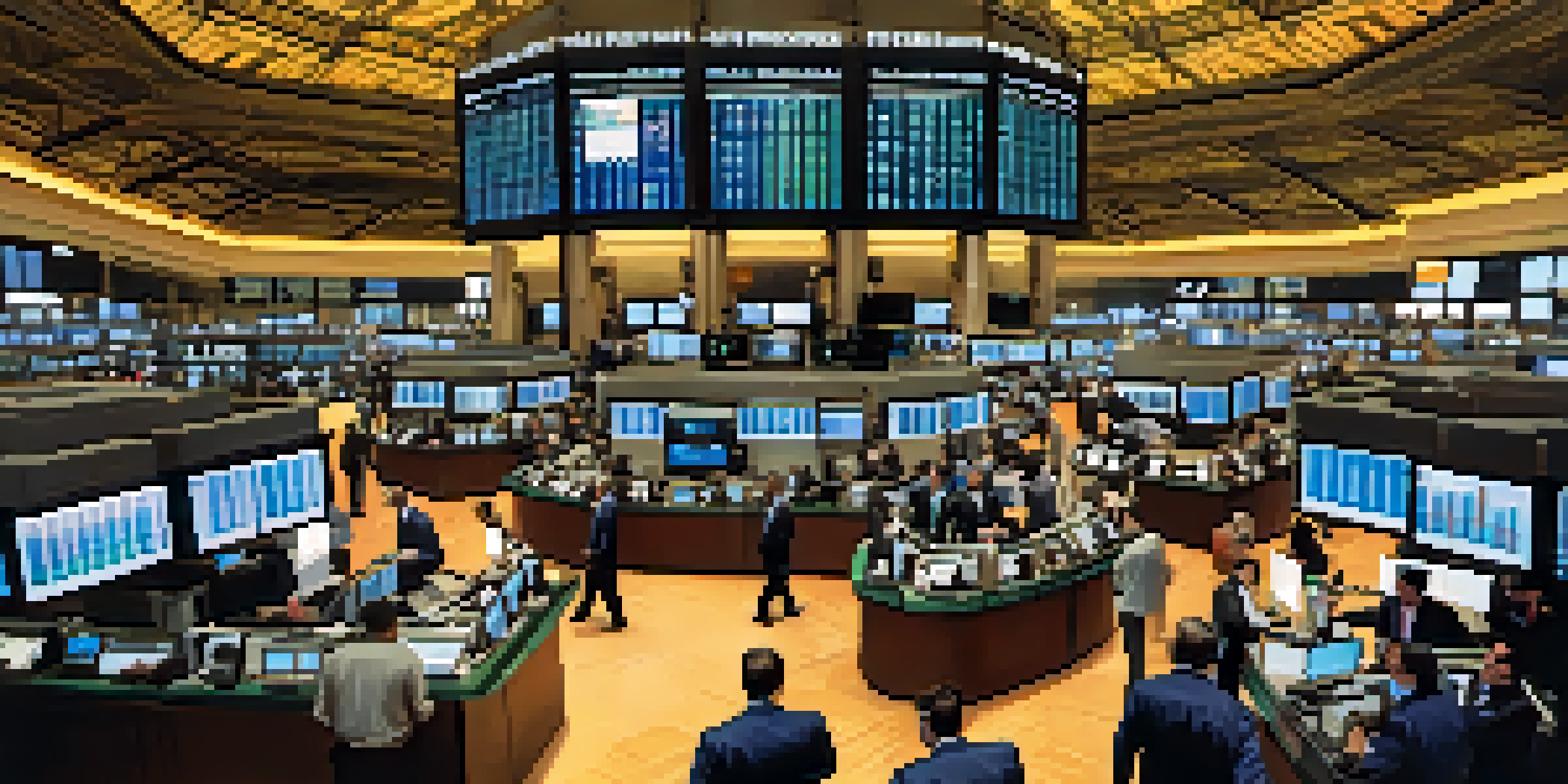The Role of Market Makers in Stock Trading Explained

What Are Market Makers and Their Function?
Market makers are essential players in the stock trading ecosystem. They are firms or individuals that provide liquidity by buying and selling securities on a regular basis. Their primary role is to ensure that there is always a market for stocks, which helps investors to buy and sell without significant delays.
Liquidity is the lifeblood of markets; when it dries up, prices can swing wildly, and panic can ensue.
By continuously quoting buy and sell prices, market makers help narrow the spread between these prices, making trading more efficient. This is crucial, especially during times of high volatility when many traders are looking to enter or exit positions quickly. Without market makers, the market could become illiquid, leading to wider price spreads and increased trading costs for everyone.
In essence, market makers act as intermediaries, bridging the gap between buyers and sellers. They take on the risk of holding stocks in their inventory, which allows them to facilitate trades promptly. This role is vital in maintaining a stable and orderly market.
How Market Makers Influence Stock Prices
Market makers play a significant role in influencing stock prices through their trading activities. When they buy or sell large quantities of a stock, it can affect the stock's supply and demand dynamics, which ultimately impacts its market price. For instance, if a market maker sees high demand for a particular stock, they may raise the price to balance supply and demand.

Conversely, if a market maker has a surplus of a stock in inventory, they might lower the price to encourage selling. This dynamic interaction can lead to price fluctuations, especially in less liquid stocks where a few trades can significantly impact the price. Therefore, the actions of market makers can create ripples throughout the market.
Market Makers Provide Liquidity
Market makers are vital for ensuring that there is always a market for stocks by continuously buying and selling, which helps maintain liquidity.
However, it's important to note that market makers are not the sole influencers of stock prices. Various factors, such as company performance, economic indicators, and investor sentiment, also play critical roles. Market makers simply add another layer of complexity to this intricate pricing puzzle.
The Importance of Liquidity in Stock Trading
Liquidity refers to how easily an asset can be bought or sold in the market without affecting its price. In the context of stock trading, liquidity is paramount because it ensures that traders can execute their buy or sell orders promptly. Market makers contribute significantly to market liquidity by consistently providing buy and sell orders.
Market makers are the unsung heroes of the trading world, ensuring that buyers and sellers can connect seamlessly.
When a market is liquid, traders can enter and exit positions with little friction, which can minimize costs and risks. For example, if you want to sell shares of a popular stock, a market maker will likely be available to buy your shares, allowing you to complete the transaction quickly. This is especially beneficial for large trades, where the absence of liquidity could lead to substantial price changes.
Ultimately, a liquid market fosters investor confidence. When traders know they can easily buy or sell shares, they are more likely to participate actively in the market, contributing to overall market health and stability.
Market Makers and Volatility: A Double-Edged Sword
While market makers provide essential liquidity, they can also contribute to market volatility. In times of market stress, such as during a financial crisis, market makers may withdraw from the market or widen their spreads. This can exacerbate price swings, making it harder for traders to execute orders at desired prices.
For example, during the early days of the COVID-19 pandemic, many market makers reduced their activities, leading to increased volatility and wider spreads. This situation highlighted how reliance on market makers can become a risk factor during turbulent times. Their exit can create a vacuum of liquidity, causing prices to fluctuate wildly.
They Influence Stock Prices
Through their trading activities, market makers can impact stock prices by adjusting their buy and sell quotes based on supply and demand.
However, it’s important to remember that market makers are not the root cause of volatility; they are simply responding to market conditions. Their actions reflect the underlying supply and demand dynamics at play, and their presence can help stabilize markets when conditions are favorable.
The Role of Technology in Modern Market Making
Technology has revolutionized the role of market makers in the stock trading landscape. Automated trading systems and algorithms enable market makers to respond to market conditions in real-time, providing quotes and executing trades at lightning speed. This technological advancement has greatly improved efficiency and reduced the costs associated with trading.
Moreover, sophisticated algorithms can analyze vast amounts of market data to identify trading opportunities or risks almost instantaneously. For example, a market maker's algorithm might detect a surge in buying interest and adjust its prices accordingly to manage inventory and mitigate risk. This level of responsiveness is critical in today's fast-paced trading environment.
However, the reliance on technology also means that market makers must continually adapt to evolving market conditions and regulatory frameworks. As markets become more complex, the challenge lies in balancing speed, accuracy, and compliance with market regulations to ensure a fair trading environment.
Market Makers vs. Other Types of Traders
Understanding the distinction between market makers and other types of traders is essential for grasping their unique role in the market. Unlike retail traders who buy and sell for their own accounts, market makers operate on behalf of their firms, taking on the risk of holding inventories of stocks. This means their objectives are different: while retail traders focus on personal profit, market makers prioritize maintaining liquidity.
Institutional traders, on the other hand, may also seek to influence stock prices but do so with larger volumes and different strategies. They often engage in strategies that can affect market dynamics, but they do not have the same obligation to provide liquidity as market makers. The interplay between these different types of traders creates a dynamic market environment.
Technology Shapes Market Making
Advancements in technology allow market makers to respond quickly to market changes, enhancing efficiency and reducing trading costs.
In summary, each player in the market has a distinct role, and market makers are crucial in ensuring that trading remains fluid and efficient. Their presence allows other traders to execute their strategies while minimizing the risks associated with illiquid markets.
The Future of Market Making in Stock Trading
As the financial landscape continues to evolve, the role of market makers is also changing. With the rise of decentralized finance (DeFi) and trading platforms that utilize blockchain technology, traditional market-making functions may face new challenges and opportunities. These platforms often operate without traditional intermediaries, which could reshape how liquidity is provided in the market.
Additionally, regulatory changes may impact the operations of market makers. As authorities seek to ensure fair trading practices, market makers must navigate new rules and adapt their strategies accordingly. This could lead to increased transparency and competition among market makers, ultimately benefiting traders.

Despite these changes, the core function of market makers—to provide liquidity and facilitate trades—will likely remain essential. As long as there are buyers and sellers, the need for market makers to bridge that gap will persist, ensuring that stock trading remains a vital component of the financial ecosystem.